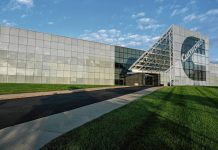
Mike Wolanin | The Republic A view of a school bus and the sign in front of Hauser Jr./Sr. High School and Hope Elementary School on the first day of school in Hope, Ind., Wednesday, Aug. 10, 2022.
HOPE — The two candidates for the only contested race on the Flat Rock-Hawcreek School Corp’s school board have differing views when it comes to certain issues, including teacher compensation.
Incumbent Chad Miller, who represents the Flat Rock district, is seeking re-election, with newcomer David J. O’Neill as his opponent. While the school corporation has two other seats up for election this year, Miller’s is the only contested race. Fellow board members John D. Harker (Hawcreek) and Patrick J. Walters (at-large) are unopposed.
When asked if teachers are being compensated adequately and what can be done to improve teacher retention and recruitment, Miller said that Flat Rock-Hawcreek has done a good job with teacher retention. He also referenced the school corporation’s 2021-23 collective bargaining agreement, which collectively raises teachers’ salaries by about 10% over two years.
Flat Rock-Hawcreek Teachers Association co-presidents Andrea Reed and Julia Swegman called it “the largest raise we have bargained in recent memory.”
O’Neill, on the other hand, feels that more could be done to improve teachers’ salaries. His wife used to teach when they lived in North Dakota and Minnesota. He said that since he’s moved here and learned more about the issue, he does not feel teachers are paid enough.
In regards to retention and recruitment, he said that the school corporation should focus on creating a “good learning environment” for teachers and students.
“You’re in a very large office that you share with 20 small children or 20 young adults,” he said. “And so it has to be a good place that you want to spend time with and that they want to spend time with. And that takes — you can’t just put people in a barren room. You need a warm, inviting space so they can focus on learning and paying more attention to school and putting aside, maybe, things that happen at home.”
The two candidates were also asked about other subjects. Their responses were as follows:
Q: How do you define critical race theory (CRT), and what is your opinion on it?
“Critical race theory, to me, is just another potentially disastrous political area, depending on what side you view as correct,” said Miller. “I think it’s a touchy situation for a lot of people. But again, it’s about what’s best for the children, the students, the teachers. And I think it’s not something that can be overlooked, but if we can catch the forefront of it, then I think everybody can work together for the common goal.”
He described CRT as teaching about the past and how different races have been treated.
“I think, again, it draws a fine line, to a lot of people, as far as when do you go to far, as far as the information that you give to children,” he said.
Miller does not agree with critical race theory and said it is “not something that we strive to teach in our district.”
O’Neill described CRT as “an advanced academic study of systemic issues of race relations in our country.”
“It is not something that’s taught in a primary school,” he said. “I think it’s a good course of study to learn about. It’s part of our history as a country, of all of what makes us what we are today. It’s a collective history. Things happened. It’s not something I think would be necessary, like I said, in a primary school setting. But overall, learning what has happened in the past is very important.”
He added that while he feels CRT is a hot-button issue that has been “blown out of proportion,” systemic racism is an issue in the United States and should be discussed.
Q: What can the school corporation do to address the ongoing impacts of the pandemic, both in terms of academic recovery and mental health?
“I think we stayed ahead of the curve,” said Miller. “We were able to go back mostly mask-less sooner than other districts because of our ability to social distance.”
He added that the school corporation has hired extra staff and offers counseling resources. There are also tutoring options to help students who may be behind because of eLearning.
O’Neill said that academic recovery will take time.
“The virtual was there as a stopgap measure,” he said. “It somewhat worked, but it couldn’t totally replace the learning that they would’ve done in a classroom. It was better nothing. So I think trying to focus on making sure the kids are back up to speed to where they would’ve been had it been five years ago.”
He added that having a welcoming school environment is a part of the mental health component.
Q: What is the number one thing that motivated you to run for this office?
Miller referenced his two kids, saying, “I want to make sure that our school system is in the right shape for them.”
O’Neill, who works at Toyota Material Handling, had a similar reason. His son is in first grade, so he wanted to be more involved with what’s going on at his school.
Q: Over the past couple of years, the relationships between many local school boards and community members have become strained and, in some cases, combative. At a local level, what can both parties do to promote good relations and communication?
“Both sides needs to realize that it’s about the children,” said Miller. “As school board members, you try to make the best informed decision that you can, and part of that is listening to parents, taking the time to hear their concerns, and then work with the administration to make the best possible choice that you can to benefit everybody.”
O’Neill said that it’s important to remain calm during meetings and not to take things personally.
“When tempers are flared and there are angry people — which, there will be — you just need to understand that nothing’s really personal,” he said. “People are — if certain people are acting out, it’s because in their mind, they have good reason to.”
It’s important to listen to what these people are saying, he added.
David O’Neill
Chad Miller






